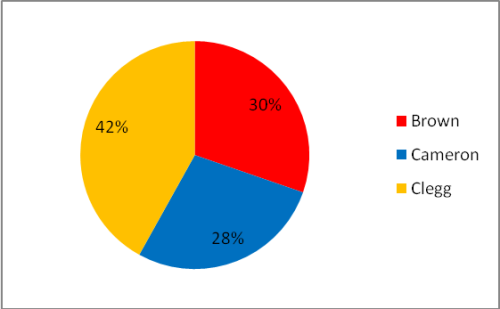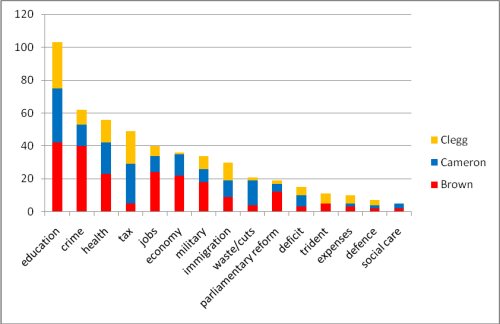In the latest of his guest posts, Simon Collister assesses the campaign over the Digital Economy Bill.
Now that the UK General Election is officially underway the media have gone into overdrive with their coverage of what the BBC is calling the 'Digital Election'. They've even made technology correspondent, Rory Cellan-Jones, 'Digital Election Correspondent' for the duration.
Dominating the digital election coverage has been Twitter: from parties using it to mobilise supporters through to its role providing a back-channel for debating the performance of party leaders during the televised debates. The media and political blogosphere have even claimed their first Twitter ‘scalp’ of the election. And, as if further evidence were needed, the BBC's Cellan-Jones took the crucial step of agreeing on what the Election hashtag was going to be.
But I want to argue that Twitter’s most interesting role since the General Election was announced is not how UK political parties plan to use it to campaign, but rather how the online grassroots lobbying over the Government’s Digital Economy Bill has perhaps provided us with a glimpse at what a digitally empowered democracy might look like.
First some background: the Digital Economy Bill (henceforth known by its Twitter hashtag #DEBill) has generated a great deal of contention owing to it's pro-industry and anti-Internet clauses. These include forcing open wifi providers, such as cafes, bars, libraries, etc, to close their networks or face crippling penalties if used to download copyrighted material, handing unprecedented powers to the Government and State to block and censor websites it (or big business) doesn’t like and taking over domain names where it sees fit.
In addition, the Labour government has received further criticism for the way it used the dissolution of Parliament ahead of an election to have the Bill approved with a minimum of debate time and scrutiny.
As a result, a range of disparate groups - from digital rights campaigners to artists and photographers - saw the Internet as key battle-ground for opposing or adequately debating the Digital Economy Bill.
Ahead of #DEBill’s main debate, social media was predominantly used by campaigners to mobilise support, highlight a wide-ranging piece of legislation with low public awareness and lobby MPs to attend the debate.
As soon as the Bill entered the House of Commons, however, Twitter become the de facto real-time social media tool for lobbying and advising MPs on the Bill’s complex content. Moreover, it arguably gave rise to a situation that could almost be described as an emergent form of digital direct democracy.
I plan to take a look at this phenomenon and offer some commentary and analysis on the way Twitter allowed the public to engage with a traditionally closed democratic process. Before I do this, however, it’s helpful to take a quick quantitative look at the #DEBill case study.
According to Twitter analytics tool, What The Hashtag?, the number of tweets containing the #DEBill hashtag across a three day period totalled 55,977. This content only covers the window from 6th April when the Bill received its first reading in the Commons until 8th April when it was given its final reading in the Lords before being passed into Law.
Add to this evidence that tracking hashtags alone provides only approximately half of the relevant Twitter content around an issue (See p. 8 of Nick Anstead and Ben O’Louglin’s working paper on Twitter and the Viewertariat [opens as pdf]) and it could be suggested the overall level of public debate was significantly higher.
The sheer volume of Twitter debate during this time-frame and in the immediate pre- and post-debate periods helped push the hashtag to the third highest global trending topic on Twitter that week.
As Twitter’s trending agenda is usually dominated by US current affairs and entertainment topics, to have the debate about a complex piece of UK legislation trending just below Justin Bieber is in itself, a major achievement.
If we drill down into this data we can take a look at some of the specific ways in which the hashtag was used. I argue that there are two outcomes for the #DEBill Twitter debate. The primary outcome is essentially an instrumental one. That is, Twitter was used to connect the public with MPs and the parliamentary process in ways and on a scale not seen before. Secondarily, I believe the way the debate played out over Twitter had an impact on the wider reputation of politics and democracy in the UK. Coincidentally, this effect comes at a crucial time for UK politics as the country prepares itself for an election where many voters have low expectations of the main parties.
Turning to Twitter and the #DEBill’s instrumental effects on UK democracy first, I want to suggest that never before have we seen the detailed machinations of parliamentary process become so transparent and porous.
While parliamentary proceedings have been televised publicly by the BBC since 1998 (although available commercially from 1992-1998), televised content rarely reaches a wide audience unless the debate is particularly newsworthy. And while the Digital Economy Bill made some headlines, its complexity meant it was unlikely to engage a mainstream audience.
During the debate, however, a group of dedicated individuals augmented live coverage of debate on BBC Parliament with a real-time stream of Twitter updates. This meant anyone with an Internet connection could track the debate live and in real-time by searching for and following the relevant hashtag.
Moreover, the use of Twitter photo and video sharing tools such as Twitpic and Yfrog were put to effective use allowing the Bill to be reported online through multimedia.
In an exchange (via Twitter) with one of the debate's most prolific tweeters, I likened this activity to a 'real-time Hansard'. While she played down the comparison due to Twitter not providing word-for-word coverage of the debate, it was certainly possible to follow the debate’s key arguments based on the verbatim information and contextual links to other online resources being tweeted.
It's important to remember that it wasn’t just the public who were able to track and read about the debate using Twitter. A relatively small but significant number of MPs leading opposition to the Bill, including Eric Joyce, Tom Watson and Evan Harris, were using Twitter to engage with both constituents and opponents of the Bill during the debate.
Arguably, this sort of direct engagement, where members of the public are able to inform and shape MPs thinking on an issue of legislation is radical in the current professionalised world of lobbying. That this grassroots lobbying took place during a parliamentary debate and in real-time is perhaps a glimpse of what a more direct, Internet-enabled form of democracy might look like.
This glimpse didn’t go unnoticed by the BBC’s Rory Cellan-Jones, who noted on his blog that the #DEBill’s Twitter backchannel had 'a real sense that many people outside were connecting with the Parliamentary process for the first time'.
But as suggested above, the #DEBill debate on Twitter served an equally mportant role in influencing public attitudes towards politicians, Parliament and democracy in general. More specifically, it's possible to argue that the #DEBill debate presented the UK’s parliamentary democracy and politicians in a negative light, while at the same time portraying certain, tech-savvy MPs positively.
From a negative perspective, early in the debate a Twitter user took a photograph of a wide-angle shot of the Chamber shown on BBC Parliament’s coverage. The image reveals a largely empty House of Commons which clearly paints a highly unflattering picture of the seat of democracy. Of course, within minutes this image was widely shared via Twitpic.
The image generated outrage online as it appeared to reinforce the lack of interest in both the Bill and democratic process as a whole as, according to many, the Bill’s timing was deliberately scheduled to ensure it was rushed through Parliament with minimum oversight. Sample comments left on the Twitpic image suggest wide-spread contempt for Parliament and politicians:
“Isn't it ironic how we're lambasted by MP's for not caring and not showing up to vote? Maybe they should lead by example...” - http://twitpic.com/photos/Saevio
"'Democracy live' ... No, I think it just passed away." - http://twitpic.com/photos/pickoo
As the image was spread around the Internet similar comments emerged and led to many others questioning the number of MPs required for Parliament to be quorate and whether the current figure needs to be reviewed.
Meanwhile one user tallied up the visible number of MPs present to estimated the total percentage of MPs attending. According to the website Didmympbotherttoturnup, created in the hours after the debate, a mere 3% of MPs took part in the debate. This is in stark contrast to the 20,000 emails sent to MPs by the public lobbying them to attend.
Conversely, MPs who were engaging with the public via Twitter received support and personal thanks – both from constituents and non-constituents. In fact, one person went as far as creating a site that mapped the constituencies of MPs that voted against the Bill and who are standing for re-election. The site states its aim clearly:
“If you opposed the Digital Economy bill and want to say thank you, you may want to consider voting for them if they are your constituency MP (having made sure you are registered to vote in time for May 6). Alternatively if you can't vote for them, but are a member of their party you may wish to consider helping them get re-elected by canvassing or volunteering for their campaign. It's your choice."
Interestingly, if the image of an almost empty Parliament has become the negative meme for the #DEBill, a counter-image of tech-savvy MPs as saviours for democracy has also emerged.
Labour MP for West Bromich, Tom Watson, spear-headed the opposition to the Bill, breaking the Party whip in doing so. This image showing Tom updating what appears to be his Twitter feed mid-debate, was shared via Twitpic and tweeted widely.
Owing to his outspoken opposition to the Bill and his personal sacrifices in ensuring the Bill met with as much opposition as possible Tom can be seen as perhaps the first cross-party, cross-consitituency single-issue MP committed to championing authenticity and transparency with politics and parliamentary democracy.
About Simon Collister
Simon is Head of Nonprofit and Public Sector at We Are Social. He wil be guest blogging for us on topics related to the 2010 British general election campaign.










